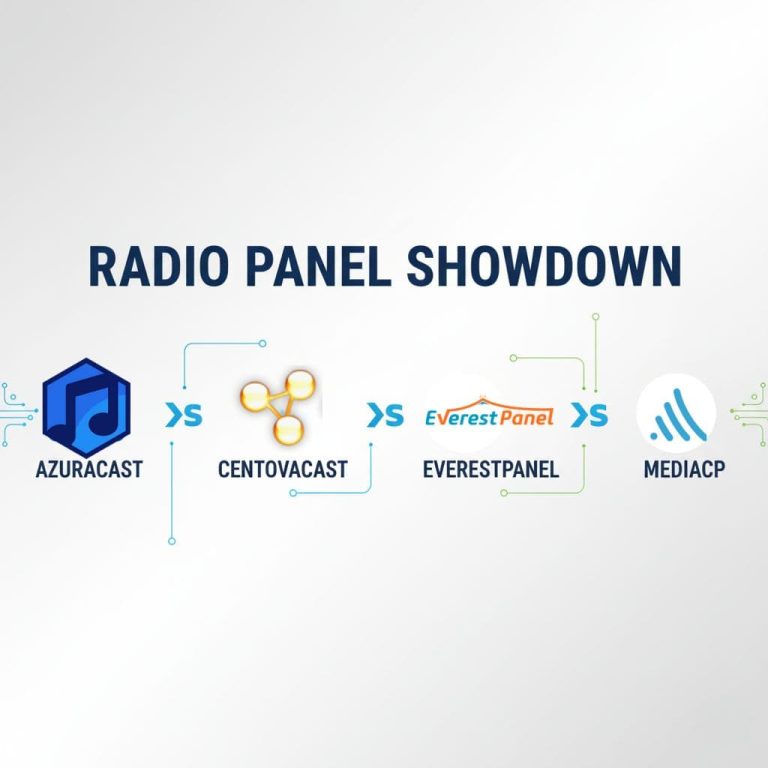SHOUTcast vs. Icecast: Choosing the Right Streaming Server
With the growth of internet radio, podcasting, and audio streaming, broadcasters need reliable server technology to deliver content to their audiences. SHOUTcast and Icecast are two of the most popular streaming server platforms, each offering unique features and capabilities. Selecting the right server for your needs depends on your use case, technical expertise, and budget.
This blog explores the differences between SHOUTcast and Icecast, highlighting their features, advantages, and potential drawbacks to help you make an informed decision.
What Are SHOUTcast and Icecast?
SHOUTcast
Developed by Nullsoft in 1998, SHOUTcast is proprietary streaming software designed primarily for internet radio broadcasting. Known for its ease of use, SHOUTcast supports the MP3 and AAC audio formats and integrates with its own directory service, SHOUTcast Radio, allowing broadcasters to list their stations for better audience discoverability.
Icecast
Icecast, introduced in 1999 by the Xiph.org Foundation, is an open-source streaming platform. It supports a variety of audio formats, including Ogg Vorbis, Opus, MP3, and AAC, offering greater flexibility. Icecast is popular among broadcasters who value customization and open-source technology.
Key Features
SHOUTcast Features
- Directory Service: SHOUTcast Radio helps broadcasters list their stations for discovery by listeners worldwide.
- Ease of Use: SHOUTcast offers a user-friendly interface that simplifies setup and management.
- Proprietary Protocol: Uses its own protocols for streaming and directory integration.
- Monetization Options: SHOUTcast provides tools to monetize streams through advertising.
Icecast Features
- Open-Source: Icecast is freely available under the GNU General Public License (GPL).
- Extensive Format Support: Works with MP3, Ogg Vorbis, AAC, and Opus.
- Stream Fallbacks: Redirects listeners to alternate streams if the main stream is unavailable.
- Stream Relay: Allows relaying streams from other Icecast or SHOUTcast servers.
- Customizability: Highly configurable for advanced users and developers.
SHOUTcast vs. Icecast: Feature Comparison
Licensing
- SHOUTcast: Requires a commercial license for monetized or large-scale broadcasting.
- Icecast: Free to use, with no licensing fees, even for commercial applications.
Audio Formats Supported
- SHOUTcast: Primarily supports MP3 and AAC, though advanced versions offer compatibility with other formats.
- Icecast: Supports a wider range of formats, including open-source options like Ogg Vorbis and Opus.
Setup and Configuration
- SHOUTcast: Designed for quick setup, SHOUTcast is ideal for users seeking simplicity.
- Icecast: Offers extensive configuration options but has a steeper learning curve, making it better suited for technically proficient users.
Compatibility
Both SHOUTcast and Icecast are compatible with popular media players like VLC, Winamp, iTunes, and web-based players. However, Icecast’s support for open formats like Ogg Vorbis makes it more flexible in certain use cases.
Audience Reach
- SHOUTcast: With its integrated directory service, SHOUTcast makes it easier for broadcasters to reach listeners.
- Icecast: Does not have a built-in directory, requiring broadcasters to rely on other methods for audience discovery.
Pros and Cons of SHOUTcast
Pros:
- Easy to Use: Intuitive setup and management make SHOUTcast accessible to beginners.
- Directory Integration: Stations are automatically listed in SHOUTcast Radio for greater visibility.
- Monetization Tools: Built-in features allow broadcasters to generate revenue through ads.
Cons:
- Licensing Costs: Commercial use requires a license, which may be a barrier for small broadcasters.
- Limited Format Support: Focuses on MP3 and AAC, which may not be ideal for all users.
- Less Customizable: Compared to Icecast, SHOUTcast offers limited flexibility for advanced configurations.
Pros and Cons of Icecast
Pros:
- Open Source: Completely free to use and modify, with no licensing fees.
- Format Versatility: Supports MP3, AAC, Ogg Vorbis, and Opus, catering to a broad range of needs.
- Highly Customizable: Ideal for advanced users who require tailored solutions.
- Stream Fallbacks: Ensures uninterrupted listening by redirecting audiences to backup streams.
Cons:
- Steep Learning Curve: Configuration and management require technical knowledge.
- No Built-in Directory: Broadcasters must find other ways to promote their streams.
Choosing the Right Server for Your Needs
Consider Your Use Case
- For Beginners: SHOUTcast’s user-friendly interface and built-in directory make it ideal for those new to streaming.
- For Advanced Users: Icecast’s flexibility and support for open formats make it a better choice for developers and experienced broadcasters.
Budget Constraints
- SHOUTcast: Licensing fees may be a concern for smaller broadcasters.
- Icecast: Free to use, making it a budget-friendly option.
Scalability
Both platforms can handle large audiences, but Icecast’s advanced configuration options often make it more adaptable for complex setups.
Audio Format Requirements
- If you need advanced format support or plan to use open-source formats, Icecast is the better option.
- For basic MP3 or AAC streaming, SHOUTcast is sufficient.
Monetization Goals
SHOUTcast’s monetization tools may be appealing if you plan to generate revenue through advertisements.
Check SHOUTcast and Icecast hosting plans here.
Practical Scenarios
Example 1: A Local Internet Radio Station
A small station targeting a local audience may prefer SHOUTcast due to its ease of use and directory listing capabilities, which help attract listeners.
Example 2: A Developer-Led Podcast Network
A tech-savvy team running multiple podcast streams might opt for Icecast for its flexibility, support for open formats, and stream fallback features.
Example 3: A Commercial Streaming Service
A commercial broadcaster seeking scalability and monetization tools may choose SHOUTcast for its integrated ad support, though they might incur higher costs.
Step-by-Step Setup Overview
Setting Up SHOUTcast:
- Download SHOUTcast DNAS from the official website.
- Install the server software on your system.
- Edit the configuration file (sc_serv.conf) to define your stream parameters.
- Use a source client like Winamp with the SHOUTcast DSP plugin to start broadcasting.
Setting Up Icecast:
- Download Icecast from the Xiph.org website.
- Install the server software and configure it by editing the icecast.xml file.
- Connect a source client such as Butt or Mixxx to send audio to the server.
- Launch the server and begin streaming.
Conclusion
Both SHOUTcast and Icecast are powerful tools for online audio broadcasting, but their differences make them suitable for different users. SHOUTcast shines in simplicity, built-in audience reach, and monetization, while Icecast excels in flexibility, open-source freedom, and advanced format support.
To choose the right server, assess your technical skills, budget, and goals. Beginners or those prioritizing ease of use may find SHOUTcast a better fit, while advanced users and developers will appreciate Icecast’s capabilities. Regardless of your choice, both platforms provide reliable solutions for delivering high-quality audio content to your audience.
Do you have specific requirements or need further clarification? Feel free to ask in the comments!



